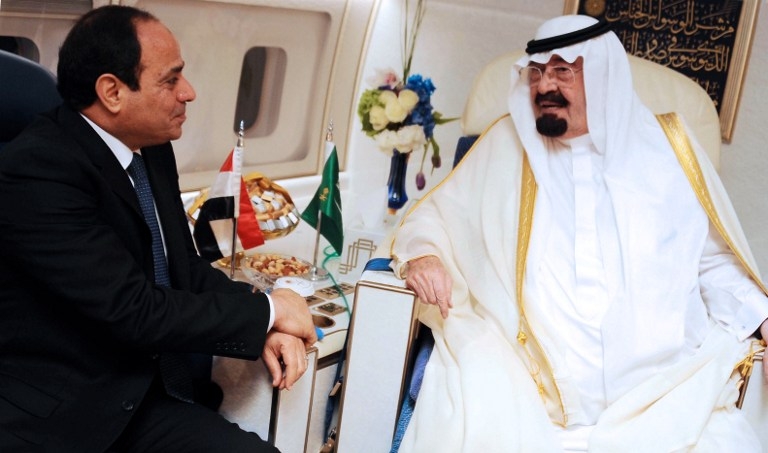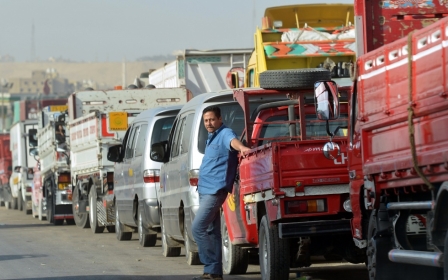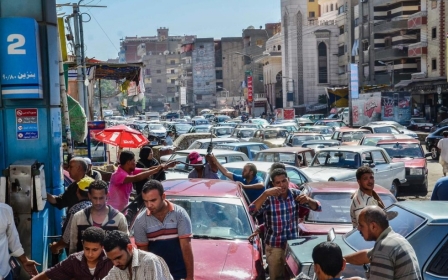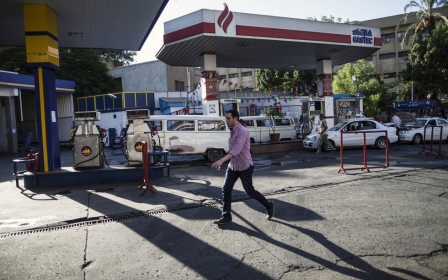Sisi’s subsidy cuts dictated by Gulf dependence
Published date: 12 February 2015 16:45 GMT
|
Last update: 9 years 9 months ago
By introducing a plethora of additional taxes to the Egyptian public, officials hope to convince the Gulf that Egypt will one day stand on its own

On 6 July, the day after increases in petrol and diesel prices went into effect, the two men responsible for this measure, Finance Minister, Hani Kadry Dimian and Petroleum Minister, Sherif Ismail, boarded a plane for Abu Dhabi.
This reflected the harsh reality that justifying the prices increases to the Egyptian public is not necessarily as important as seeking to solicit Gulf Arab donors, persuading them that the billions of dollars invested in Egypt will not be swallowed up in the bottomless pit of the state’s budget deficit.
The price increases have been met with widespread discontent, as they have led to a spike in transport costs, which has already progressed on to increased food prices. However, the measure should not have come as a surprise. The government has been grappling with energy subsidies for decades, and the problem worsened when oil prices climbed in the mid-2000s to their current level of over $100/barrel.
The first serious step to cut fuel subsidies was taken under the presidency of Mohammed Morsi (when Dimian was still in effective charge of budgetary policy). At that time, a digital system of monitoring wholesale trade in petroleum products was introduced and the price of high-grade, 95-octane, petrol rose November 2012 to £E5.85/litre (equivalent to 96 US cents at the exchange rate at that time).
Much of the planning for subsidies reform had been done earlier under the Mubarak regime, including setting up databases to allow for cash compensation and the printing of coupons for the distribution of cooking gas under a rationing system. But President Mubarak was hesitant to implement such reforms, for fear of provoking protests.
On assuming the presidency in June 2014, Abdel-Fattah al-Sisi quickly gave a signal of his approach to economic policy by rejecting the draft budget for 2014/15 (July-June), which had projected a deficit of 12 percent of gross domestic product (GDP). This was, in effect, a green light for Dimian to activate plans to cut the fuel subsidies bill. He produced a revised budget with the deficit reduced to 10 percent of GDP, largely thanks to bringing the energy subsidies allocation down to £E100.3bn from £E144bn.
It was then up to the petroleum ministry to make the necessary adjustments to fuel prices: low-grade, 80-octane, petrol went up by 78 percent to £E1.60 per litre; the heavily used 92-octane petrol went up by 41 percent to £E2.60; 95-octane rose by 7 percent to £E6.25; diesel increased by 64 percent to £E1.80; and the price of compressed natural gas rose by 175 percent to £E1.10 per cubic metre. Tariffs for electricity also rose by about 20 perecent on average, across seven bands for residential users.
Comparing the new prices in US dollars with the situation in November 2012 shows a less dramatic increase, as the Egyptian pound has depreciated by about 14 percent since then. The dollar price of 95-octane petrol is actually 7 percent lower, at 88 cents.
Even with the price increases, Egyptian petroleum products remain heavily subsidised. According to a table in the revised budget statement, the price at which cooking gas is sold only covers 5 percent of its cost. Diesel accounts for about 45 percent of the total fuel subsidies bill, and the sales revenue will cover only 36 percent of the costs. The government will also still be subsidising petrol to the tune of £E20bn.
The budget statement includes figures for the expected outturn for the fiscal year that has just finished. The bottom line shows that the deficit was about 12 pecent of GDP. However, it would have been considerably higher without the inclusion of £E117bn ($16.5bn) of grants from Gulf Arab donors as part of revenue. This sum is equivalent to almost one-quarter of total revenue. If these grants are excluded, the deficit would be 17.7 percent of GDP, which would have presented a huge financing challenge to the government, whose borrowing needs are already straining the capacity of the banking system.
The high cost of subsidies is only one aspect of the government’s budgetary problems. On the spending side, public sector wages have more than doubled in the past five years, and the cost of servicing public debt has risen by a similar margin. The biggest problem on the revenue side is the consistent failure to hit tax targets. In 2013/14, the government aimed to collect £E359bn in direct and indirect taxes, but expects to garner only £E288bn, a shortfall of £E71bn, or 20 percent. Recent measures, such as the introduction of capital gains tax, the imposition of a wealth tax and the long-delayed implementation of a property tax will help to boost revenue to some extent, but the most effective remedy would be higher rates of economic growth. The economy is expected to have grown by 2 percent in 2013/14, and the government forecasts growth of 3.2 percent in 2014/15, well short of the 6-7 percent needed to underpin a genuine recovery.
The finance ministry has entered a relatively modest figure of £E23.5bn for foreign grants in the revenue column of the 2014/15 budget, reflecting aid pledges that have actually been made. With the tax revenue target likely to be missed once more, the government is likely to need a considerably larger amount of foreign grants than originally budgeted for, if it is to stand a chance of keeping the deficit at around 10 percent of GDP.
Increasing fuel prices is one of the few means that the government has at its disposal to show the Gulf donors that it is making serious efforts to enact reforms needed to enable it to do without such support. As far as the Egyptian public is concerned, the government should also be taking steps to explain not only the rationale behind the price increases, but the measures that it is planning to bring in to compensate the most vulnerable groups in society.
- David Butter is an analyst of politics, economics and business in the Middle East North Africa (MENA) region, and has been an associate fellow in the Chatham House MENA programme since August 2012.
The views expressed in this article belong to the author and do not necessarily reflect the editorial policy of Middle East Eye.
Photo credit:Saudi King Abdullah visits Egypt's Sisi (AFP)
New MEE newsletter: Jerusalem Dispatch
Sign up to get the latest insights and analysis on Israel-Palestine, alongside Turkey Unpacked and other MEE newsletters
Middle East Eye delivers independent and unrivalled coverage and analysis of the Middle East, North Africa and beyond. To learn more about republishing this content and the associated fees, please fill out this form. More about MEE can be found here.





